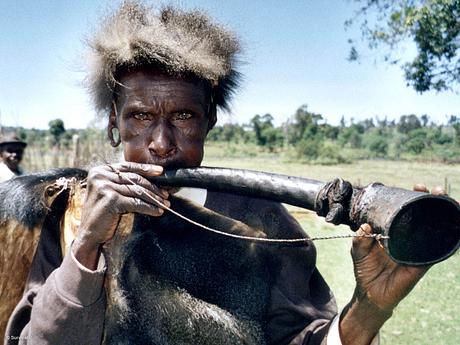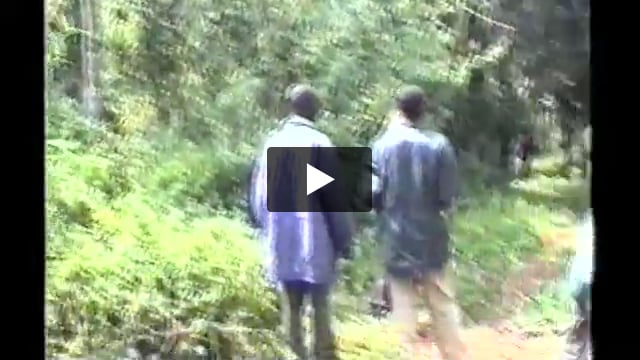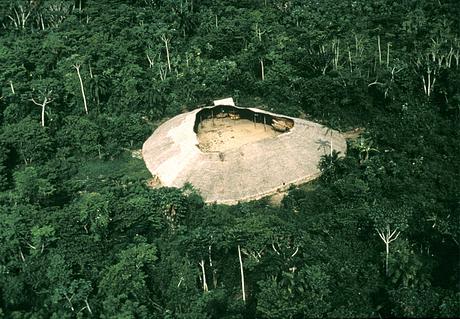Kenya: Government destroys the Ogiek's forest
November 30, 2001
This page was last updated in 2001 and may contain language which is now outdated.
"Settlement of other people in our midst would mean that the Ogiek culture would cease. We will be wiped out." Joseph Towett, Chairman, Ogiek Welfare Council.
The Ogiek people of Kenya are resisting a government that seems determined to destroy their forest home.
The Ogiek, who number about 20,000, have lived since time immemorial in the Mau mountain forest overlooking Kenya's Rift Valley. They live by gathering wild plants and hunting, but most of all they are famous as collectors of honey from beehives in the high branches of the forest trees. As well as eating this honey themselves, they also trade with neighbouring peoples living outside the forest. Some Ogiek in the deep forest live purely by hunting and gathering; others supplement their hunting with small vegetable plots and some livestock. For all Ogiek, bee-keeping and collecting honey remain central to their way of life. As a hunter-gatherer people they are looked down on by their cattle-herding neighbours.
Mau, the Ogiek's ancestral home, is a protected area under Kenya's Forest Act. Ever since colonial times, governments have tried to evict them from the forest, under the fiction of 'protecting the environment' from the Ogiek's activities; even this year the authorities have tried to throw the Ogiek out of their homeland. Up until now, the Ogiek have always made their way back. But now they are facing the worst threat yet.
While still claiming that the forest needs protection from these hunter gatherers who have always managed it sustainably, the Kenyan government has opened up nearly 60,000 hectares of it for private use. Those who will benefit are mostly not the Ogiek, but developers such as tea planters and loggers, along with settlers from elsewhere in the country. Three powerful logging companies – Pan African Paper Mills, Raiply Timber, and Timsales Ltd – are already active in the forest.
Allowing outsiders into the Mau forest is in fact part of a larger vote-winning scheme to open up around one tenth of Kenya's forests for settlement by some of the country's many landless people – the Mau forest makes up a large proportion of the total area being opened up. The tragedy is that if the government's scheme goes ahead, the Ogiek will simply join the numbers of Kenya's dispossessed and die out as a people. The plan also threatens Kenya's environment, as the Mau forest is a vital water catchment area. Drought is already endemic in Kenya, and experts agree that the loss of forest cover will worsen the problem, affecting neighbouring Tanzania also.
The plan to open up the nation's forests was first announced in January 2001, sparking a wave of international protest. There was opposition in the Kenyan parliament, and protests and petitions from environmentalists. The Ogiek Welfare Association obtained an order from the Kenya High Court halting the opening up of 35,000 hectares in East Mau until after the resolution of a case which they had filed in defence of their land as long ago as 1997. Local authorities tried, through threats and intimidation, to make the Ogiek withdraw the case, but they remained firm; one elder told the local head of government, 'No amount of intimidation will deter us from demanding our God-given right within the constitution.' In an obvious attempt to avoid answering the Ogiek's claims, the case has been postponed. Yet surveying of the disputed land has gone on, in clear contempt of court. Once the East Mau has been opened up, the same is likely to happen to other Ogiek areas.
In October 2001, the environment minister gave the order to go ahead with the opening up of these forest areas, and there are reports that loggers have already started systematic clearing of the newly-opened forest tracts. By going ahead, the Kenyan government is defying international opinion, its own legal system and the Ogiek's rights under international law, and is endangering the survival of the Ogiek as a people.




